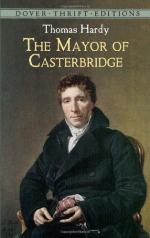|
This section contains 945 words (approx. 4 pages at 300 words per page) |

|
Change in Casterbridge
Summary: Describes the evolution from a traditional point of view to a modern point of view within the four main characters of Hardy's Mayor of Casterbridge. Examines main themes such as modernism, individualism, and more importantly, the relationship between character and fate.
The Mayer of Casterbridge, a novel by Thomas Hardy, was written in the late nineteenth century. An alternate title for the work is "The Life and Death of a Man of Character." There are many ideas that Hardy dictates in this novel, including modernism, individualism, and more importantly, the relationship between character and fate. Hardy gives us two perspectives on the idea of destiny; he explores the idea through the characterization of two sets of characters. Henchard and Lucetta give light to the idea that character is fate, however, Farfrae and Elizabeth-Jane illustrate the idea that change for the better is very possible.
Henchard, the tragic hero of the novel, is clearly a man who suffers greatly. Hardy presents to us a premise of coincidence and blind fate. It is an ongoing, cruel fate that Hardy forces Henchard to go through. He makes Henchard undergo a serious force...
|
This section contains 945 words (approx. 4 pages at 300 words per page) |

|


